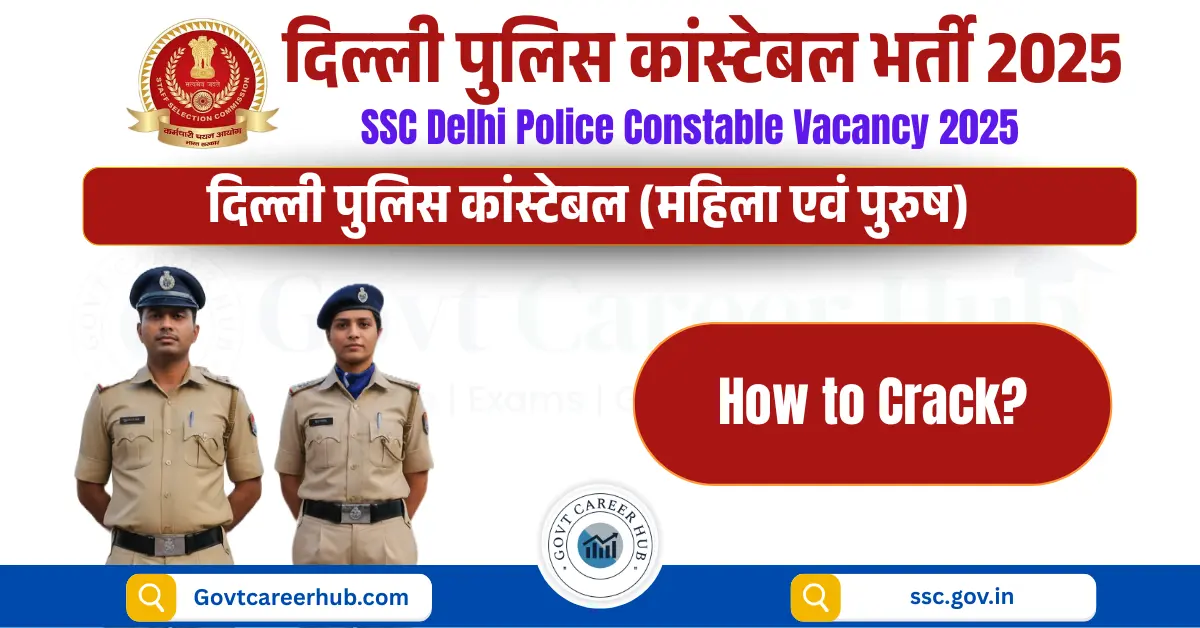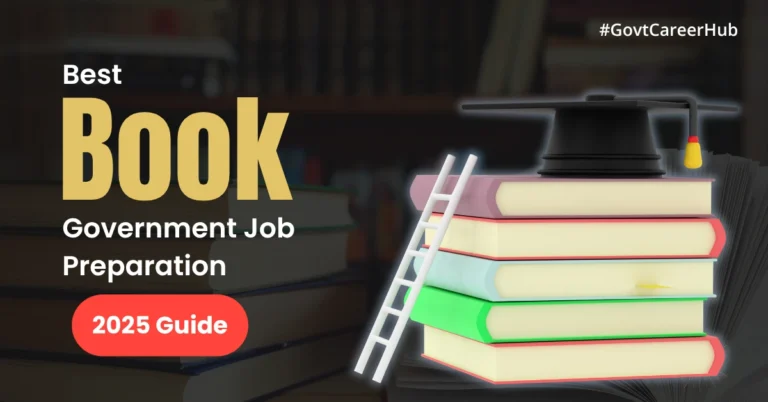How to Crack SSC Delhi Police Constable Exam 2025: Complete Guide for Success

Last Updated: September 23, 2025 at 3:50 pm
The SSC Delhi Police Constable exam is one of the most competitive government job examinations in India. With over 7,500 vacancies announced for 2025, this represents a golden opportunity for candidates seeking a stable career in law enforcement. This comprehensive guide will walk you through everything you need to know to crack this exam successfully.
Understanding the SSC Delhi Police Constable Exam
The Staff Selection Commission (SSC) conducts this exam to recruit Constable (Executive) positions for Delhi Police. The examination follows a multi-stage selection process designed to identify the most suitable candidates for police service.
Key Exam Details (2025)
- Total Vacancies: 7,565 posts
- Application Period: September 22, 2025 to October 21, 2025
- Exam Date: December 2025/January 2026 (tentative)
- Application Fee: ₹100 (exempted for women, SC/ST, and ex-servicemen)
- Age Limit: 18-25 years (with relaxations for different categories)
- Educational Qualification: 10+2 from recognized board
Complete Details : Delhi Police Constable Vacancy SSC Delhi 2025 – Apply Online
Complete Selection Process
The selection process consists of three main stages:
1. Computer-Based Examination (CBE)
- Duration: 90 minutes
- Total Questions: 100
- Total Marks: 100
- Negative Marking: 0.25 marks deducted for each wrong answer
Subject-wise Distribution:
- General Knowledge/Current Affairs: 50 questions (50 marks)
- Reasoning: 25 questions (25 marks)
- Numerical Ability: 15 questions (15 marks)
- Computer Fundamentals: 10 questions (10 marks)
2. Physical Endurance & Measurement Test (PE&MT)
This is a qualifying stage conducted by Delhi Police in Delhi.
For Male Candidates:
- Race: 1600 meters in 6-8 minutes (age-wise)
- Long Jump: 12-14 feet
- High Jump: 3’3″ to 3’9″
- Height: Minimum 170 cm
- Chest: 81 cm with 4 cm expansion
For Female Candidates:
- Race: 1600 meters in 8-10 minutes (age-wise)
- Long Jump: 8-10 feet
- High Jump: 2’6″ to 3′
- Height: Minimum 157 cm
3. Medical Examination
Final medical fitness test conducted by Delhi Police.
Cut-off Marks Strategy
Understanding cut-offs is crucial for your preparation:
- General Category: 35 marks (normalized)
- SC/ST/OBC/EWS: 30 marks (normalized)
- Ex-servicemen: 25 marks (normalized)
Pro Tip: Aim to score at least 50+ marks to stay comfortably above the cut-off.
Subject-wise Preparation Strategy
1. General Knowledge/Current Affairs (50 marks)
This section carries the highest weightage and requires consistent daily preparation.
What to Study:
- Indian History (Ancient, Medieval, Modern)
- Indian Geography (Physical and Economic)
- Indian Polity and Constitution
- Economics basics
- Current Affairs (last 6 months)
- Sports news
- Awards and honors
- Science and Technology updates
Daily Study Plan:
- Read newspapers daily (The Hindu, Indian Express)
- Follow monthly current affairs magazines
- Use apps like Daily Current Affairs
- Practice 10-15 GK questions daily
Recommended Books:
- Lucent’s General Knowledge
- Manorama Yearbook
- Pratiyogita Darpan monthly magazine
2. Reasoning (25 marks)
Reasoning questions are generally scoring if you practice regularly.
Important Topics:
- Analogies and similarities
- Pattern recognition
- Coding-decoding
- Blood relations
- Direction sense
- Logical sequences
- Figure-based problems
- Classification problems
Preparation Strategy:
- Practice 20-25 reasoning questions daily
- Focus on non-verbal reasoning
- Time yourself while solving
- Learn shortcut techniques
Recommended Books:
- RS Aggarwal Reasoning
- Kiran’s Reasoning book
3. Numerical Ability (15 marks)
Though it has fewer questions, accuracy here can boost your overall score.
Key Topics:
- Number systems
- Percentages
- Ratio and proportion
- Simple and compound interest
- Profit and loss
- Time, speed, and distance
- Mensuration basics
- Averages
Study Approach:
- Focus on basic mathematical concepts
- Practice mental calculations
- Learn percentage tricks
- Solve previous year questions
- Time management is crucial
Recommended Books:
- RS Aggarwal Quantitative Aptitude
- Fast Track Arithmetic by Rajesh Verma
4. Computer Fundamentals (10 marks)
This section is relatively easier and can be scoring with proper preparation.
Important Areas:
- MS Word basics (formatting, tools)
- MS Excel (formulas, functions, cells)
- Internet and web browsers
- Email basics
- Computer hardware/software basics
- WWW concepts
- Search engines
Preparation Tips:
- Study basic computer terminology
- Practice using MS Office
- Understand internet concepts
- Focus on practical knowledge
Physical Preparation for PE&MT
Physical fitness is as important as written exam preparation.
Running Preparation
- Start with 10-15 minutes daily jogging
- Gradually increase to 20-30 minutes
- Practice 1600-meter runs regularly
- Focus on breathing techniques
- Maintain consistent pace
Jump Preparation
- Practice long jump techniques
- Work on high jump form
- Strengthen leg muscles
- Do plyometric exercises
- Take proper rest between practice sessions
General Fitness Tips
- Maintain a healthy diet
- Get adequate sleep (7-8 hours)
- Stay hydrated
- Avoid junk food
- Include protein in your diet
Time Management Strategy
For Written Exam (90 minutes)
- General Knowledge: 35-40 minutes
- Reasoning: 25-30 minutes
- Numerical Ability: 15-20 minutes
- Computer Fundamentals: 8-10 minutes
- Review: 5-7 minutes
Smart Attempt Strategy
- Start with your strongest section
- Attempt easy questions first
- Avoid random guessing due to negative marking
- Mark difficult questions for later review
- Keep track of time continuously
Study Schedule (3-Month Plan)
Month 1: Foundation Building
Week 1-2:
- Complete syllabus analysis
- Collect study materials
- Take diagnostic test
- Start basic preparation
Week 3-4:
- Begin topic-wise study
- Start current affairs reading
- Practice basic questions
- Begin physical training
Month 2: Intensive Preparation
Week 1-2:
- Complete all major topics
- Increase practice questions
- Take sectional tests
- Intensify physical training
Week 3-4:
- Start full-length mock tests
- Work on weak areas
- Current affairs revision
- Maintain fitness routine
Month 3: Final Preparation
Week 1-2:
- Take mock tests regularly
- Focus on time management
- Revise important topics
- Peak physical training
Week 3-4:
- Light revision only
- Solve previous year papers
- Maintain fitness level
- Stay mentally prepared
Mock Test Strategy
Mock tests are crucial for success in competitive exams.
Why Mock Tests Matter
- Identify weak areas
- Improve time management
- Build exam temperament
- Track progress
- Reduce exam anxiety
How to Use Mock Tests Effectively
- Take tests in exam-like conditions
- Analyze performance thoroughly
- Review incorrect answers
- Time yourself properly
- Take 2-3 mock tests weekly
Important Tips for Success
General Preparation Tips
- Stay consistent with daily study
- Focus on accuracy over speed initially
- Keep updated with current affairs
- Practice previous year questions
- Join online test series
Exam Day Strategy
- Reach exam center early
- Carry required documents
- Stay calm and confident
- Read instructions carefully
- Manage time effectively
Physical Test Tips
- Warm up properly before events
- Wear appropriate sports gear
- Stay hydrated but not over-hydrated
- Follow official instructions
- Don’t panic if you don’t clear in first attempt
Common Mistakes to Avoid
During Preparation
- Ignoring current affairs
- Not practicing mock tests
- Focusing only on written exam
- Neglecting physical fitness
- Starting preparation too late
During Exam
- Spending too much time on difficult questions
- Random guessing due to negative marking
- Not reading questions carefully
- Getting nervous about time
- Not reviewing attempted questions
Additional Benefits and Incentives
NCC Certificate Holders
- NCC ‘C’ Certificate: 5% bonus marks
- NCC ‘B’ Certificate: 3% bonus marks
- NCC ‘A’ Certificate: 2% bonus marks
Rashtriya Raksha University (RRU) Graduates
- Additional marks based on class obtained
- Distinction: 5% bonus marks
- First Class: 4% bonus marks
- Second Class: 3% bonus marks
Final Preparation Checklist
One Month Before Exam
- Complete syllabus coverage
- Regular mock tests
- Current affairs up to date
- Physical fitness at peak
- All documents ready
One Week Before Exam
- Light revision only
- Solve last 2-3 years papers
- Maintain fitness routine
- Keep documents organized
- Plan exam day logistics
Exam Day
- Reach center 2 hours early (if not using Aadhaar authentication)
- Carry admission certificate
- Bring valid photo ID
- Have backup transportation plan
- Stay calm and confident
Conclusion
Cracking the SSC Delhi Police Constable exam requires a balanced approach combining academic preparation, physical fitness, and mental strength. Success comes to those who prepare systematically and maintain consistency throughout their preparation journey.
Remember, this exam is not just about getting a job – it’s about serving the nation and maintaining law and order in the capital city. Approach your preparation with dedication, and success will follow.
Start your preparation today, stay consistent, and give your best effort. With proper planning and execution, you can definitely crack this exam and achieve your dream of becoming a Delhi Police Constable.
Good luck with your preparation!
Note: This guide is based on the official SSC Delhi Police Constable Examination Notice 2025. Always refer to the official notification for the most current information and updates.
⬇️You May Like This:
- MP Police Subedar Eligibility 2025: Complete Syllabus & Exam Guide
- MP Police Subedar Syllabus 2025: Complete Exam Pattern & Study Guide
- MP Police Subedar Assistant Sub Inspector Vacancy MPESB Madhya Pradesh 2025 – Apply Online
- Highest Paying Government Jobs India: Complete Salary Guide 2025
- Which Govt Exam is Easy to Crack? Your Complete Guide to Landing a Government Job






